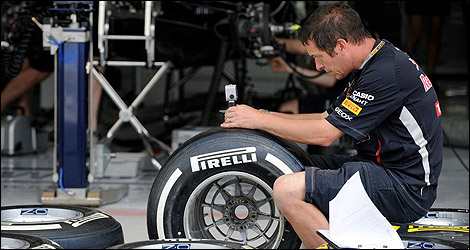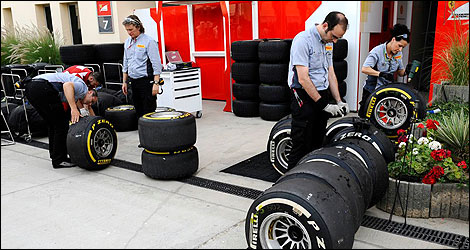Apr
27th
Stay connected Subscribe to our RSS feed
From GMM
Pirelli is getting the credit - or the blame - for F1's unstable pecking order so far in 2012.
For the first time in almost three decades, four different cars - McLaren, Ferrari, Mercedes and Red Bull - have won the opening four races of the season, while others - Lotus and Sauber - have displayed potential winning pace.
"The explanation is Pirelli -- it's the tires," Swiss commentator and former F1 driver Marc Surer told Austrian television Servus TV. "It's been a question of who can make them work, and that is depending on a number of factors."
Some cars, for example, require the tires to be running hot and working hard before they deliver their pace, whilst others only find the 'sweet spot' in cold conditions.
For most, however, it's just a mystery.
"We know we were slow (in Bahrain) but we don't understand why," revealed Melbourne winner Jenson Button.
Publicly, teams like McLaren are hailing the invigorated 'show'. Privately, they may be looking back ruefully on the Bridgestone era.
"Bridgestone made great tires that could hold on for the whole race," Surer continued. "The only tension was when the two at the front were going to pit. Now, there is a stress factor that has been produced by the tire company. Sometimes, maybe, it's a bit too much."
Vitantonio Liuzzi, the former HRT driver, doesn't agree with Surer's final point, nor Michael Schumacher's claim that Pirelli needs to rethink its approach to making F1 tires.
"The tires are not blowing up, they are not blistering and it's always a challenge for both drivers and engineers to set up the car properly and get the maximum out of them. A tricky situation," he told gocar.gr. "We have to give thumbs up to Pirelli for the work they have done."
It is on Liuzzi's point about the situation being "tricky" that F1 team bosses completely agree about.
"The challenge is how to use the tires, how to set up your car," said Mercedes' Norbert Haug.
Agreed Red Bull's Christian Horner: "I think this year the tire has dominated performance and I think it's crucial to try and understand how they work."
"It's clear," Lotus' Eric Boullier added, "that the key for performance is the tires."
Pirelli is getting the credit - or the blame - for F1's unstable pecking order so far in 2012.
For the first time in almost three decades, four different cars - McLaren, Ferrari, Mercedes and Red Bull - have won the opening four races of the season, while others - Lotus and Sauber - have displayed potential winning pace.
"The explanation is Pirelli -- it's the tires," Swiss commentator and former F1 driver Marc Surer told Austrian television Servus TV. "It's been a question of who can make them work, and that is depending on a number of factors."
Some cars, for example, require the tires to be running hot and working hard before they deliver their pace, whilst others only find the 'sweet spot' in cold conditions.
For most, however, it's just a mystery.
 |
| Red Bull engineer evaluating a brand new tire. (Photo: Pirelli) |
"We know we were slow (in Bahrain) but we don't understand why," revealed Melbourne winner Jenson Button.
Publicly, teams like McLaren are hailing the invigorated 'show'. Privately, they may be looking back ruefully on the Bridgestone era.
"Bridgestone made great tires that could hold on for the whole race," Surer continued. "The only tension was when the two at the front were going to pit. Now, there is a stress factor that has been produced by the tire company. Sometimes, maybe, it's a bit too much."
Vitantonio Liuzzi, the former HRT driver, doesn't agree with Surer's final point, nor Michael Schumacher's claim that Pirelli needs to rethink its approach to making F1 tires.
"The tires are not blowing up, they are not blistering and it's always a challenge for both drivers and engineers to set up the car properly and get the maximum out of them. A tricky situation," he told gocar.gr. "We have to give thumbs up to Pirelli for the work they have done."
 |
| Pirelli engineers analysing Ferrari's used tires. (Photo: Pirelli) |
It is on Liuzzi's point about the situation being "tricky" that F1 team bosses completely agree about.
"The challenge is how to use the tires, how to set up your car," said Mercedes' Norbert Haug.
Agreed Red Bull's Christian Horner: "I think this year the tire has dominated performance and I think it's crucial to try and understand how they work."
"It's clear," Lotus' Eric Boullier added, "that the key for performance is the tires."
 The latest auto news, reviews, prices, product and vehicle releases.
The latest auto news, reviews, prices, product and vehicle releases.